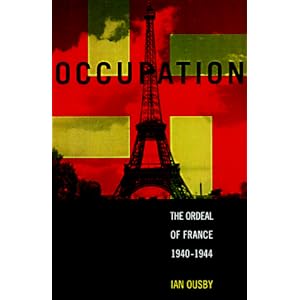Summer Series 2010: OCCUPATION: The Ordeal of France 1940-1944
Summer Series 2010: Reviewing the Books! has begun. First up is a book that was a gift from my regular guest-blogger, Charles Cameron:

Occupation: The Ordeal of France 1940-1944 by Ian Ousby
“France Fell because there was corruption without indignation”
– Romain Rolland
“‘Stalin let fly with some choice Russian curses and said that now Hitler was sure to beat our brains in.”
– Nikita Khrushchev, on the Fall of France.
One of the mystifying events of twentieth century military history is the rapid collapse and defeat of France in 1940 under the tank treads of von Rundstedt’s and Guderian’s panzers. France, an ancient great power, possessed of a vast colonial empire and a well-equipped army, which had held out through four years of terrible trench warfare in the Great War, was brought to her knees in a mere six weeks despite having twice the number of guns and a third more tanks than the Wehrmacht, plus the aid of 300,000 Tommies of the British Expeditionary Force. Equally remarkable as their destruction in combat operations, was the bewildering speed with which the French, a people with centuries of martial glory and valorous performance on the battlefield, acquiesced to German occupation and quietly resigned themselves to vassalage in the Nazi New Order. It is this complex and depressing history that Ian Ousby seeks to explain in OCCUPATION: The Ordeal of France 1940-1944.
Ousby, who made extensive use of French primary and secondary source material, peels away the hazy mist of postwar Gaullist revisionism to show a France grown weary democracy, of the bitter political divisions intrinsic to the Third Republic, suspicious of Jews, antifascist refugees and perfidious Albion, resentful of having to shoulder the burdens of war and all too eager to lay them down at the first opportunity. Ousby quotes an Army officer and later Resistance leader, Henri Frenay:
Then I saw our men, who had fought so well right up to the last moment, throw down their weapons, cast away their equipment and join together dancing on the road or in the clearings. Forgotten was the disaster, the surrender, self-respect, the dignity which the defeated should maintain in the presence of the victor. No, I was not wrong: in the looks of the young German soldiers who passed I read astonishment and contempt.
Compiègne in 1940 is not to be confused with Appomattox.
Ousby carefully parses distinctions, now long forgotten, between the various factions among the French who struggled to accept the reality of defeat: leftist intellectuals like Sartre and his circle, antiquarian reactionaries like Charles Maurras, the Vichy regime, Petainiste cultists, the Fascist ultra-Collabos of Paris and the brutal Miliciens, the Resistance, the Free French of General Charles DeGaulle and ordinary citizens scraping to get by under increasingly bleak conditions. What stands out as theme in Ousby’s work is how widely unrealistic illusions were embraced by the French in their acclamation of Marshal Petain’s assumption of power, illusions that the Germans were eager to humor and the deeply felt pain as self-deception gradually failed to hide bitter truth from the French. Ousby demolishes the idea that the Fall of France can be laid at the door of Weygand, Petain, Laval and a few deluded Fascists at Je Suis Partout.
Which is not to say that the Third Republic’s misguided politicians, the rulers of Vichy and their more extreme Fascist ultra-collabo rivals do not loom large OCCUPATION. The vainglorious ego and senile cunning of Marshal Henri Petain, as the national hero of Verdun postulates collaboration as the highest form of patriotism, is distrurbing. He used his moral authority to give benediction to a shabby, puppet regime based on the long-nursed grievances of the French far-right against liberalism, democracy, the Jews, secularism, urbanism, and all elements the Third Republic inherited from the French Revolution except a narrow, provincial, variant of nationalism.
If the cost of Petain’s papier-mache cult of personality was merely France’s dignity, the price of Pierre Laval’s exercise of power was Vichy France’s truckling subservience to Nazi Germany. Oily, opportunistic and corrupt, Laval had his grasping fingers in every sordid pie, from banal looting to collaborating in the Holocaust to sending Frenchmen into slave labor in German factories and mines. It was Laval who created the thuggish, Fascist gendarmerie, the Milice. Hitler could not stand him but found Laval useful enough that the German Ambassador, Otto Abetz, acted as Laval’s political godfather, as he did to a host of sinister and deranged French ultra-collabos and Parisian gangsters on the Nazi payroll. Unlike the aged Marshal Petain, Laval would die before a firing squad as a traitor to France.
A weakness of OCCUPATION is that the sections on the aftermath of liberation, the settling of accounts by the Resistance and the restoration of the Republic are too short in light of the national trauma that Ousby details. While present in a series of chapters these facets are covered by Ousby with a lighter hand, mirroring, perhaps unintentionally, the desire of the French to put the Occupation and Vichy behind them as quickly as possible. They could easily have been extended by about half again their actual length, examining a period of postwar history that has been understudied.
OCCUPATION can be summed up perfectly in its’ subtitle – “the Ordeal of France”.



September 7th, 2010 at 3:52 am
A good source for filling in the blanks not addressed about the aftermath of liberation, is this treatment by Anthony Beevor and his wife Atremis Cooper in Paris After the Liberation 1944-1949.
http://www.amazon.com/Paris-After-Liberation-1944-1949-Revised/dp/0142437921/ref=sr_1_4?s=books&ie=UTF8&qid=1283831194&sr=1-4
September 7th, 2010 at 5:30 am
A favorite Wikipedia quote:
September 8th, 2010 at 2:43 am
Excellent quote, JF. Sounds like DeGaulle.
.
HG – Have you read this yet?
.
September 8th, 2010 at 4:28 am
Haven’t yet. It is on the ever present and growing reading list.